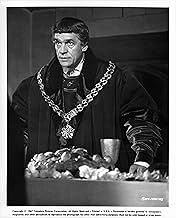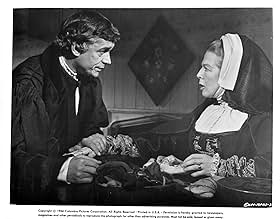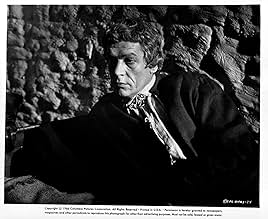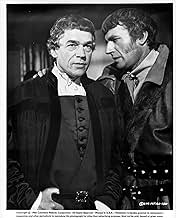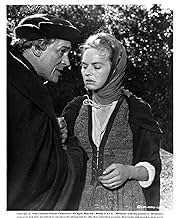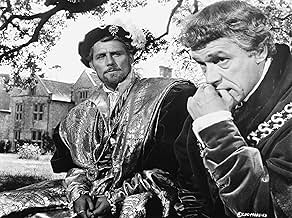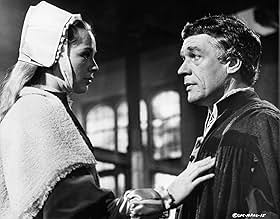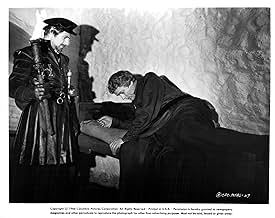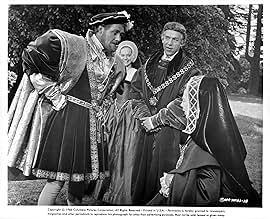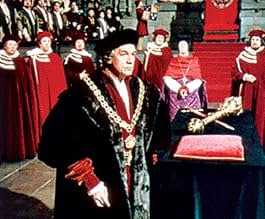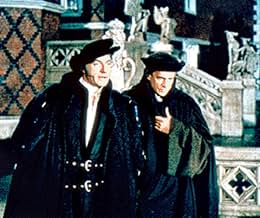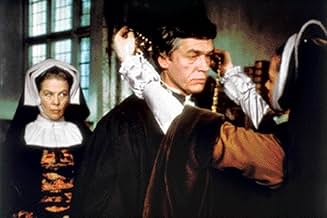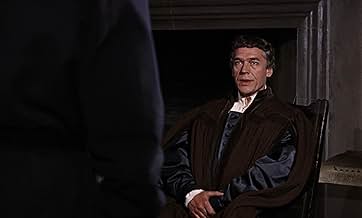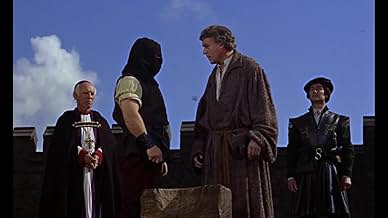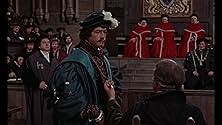Paul Scofield credited as playing...
Sir Thomas More
- William Roper: So, now you give the Devil the benefit of law!
- Sir Thomas More: Yes! What would you do? Cut a great road through the law to get after the Devil?
- William Roper: Yes, I'd cut down every law in England to do that!
- Sir Thomas More: Oh? And when the last law was down, and the Devil turned 'round on you, where would you hide, Roper, the laws all being flat? This country is planted thick with laws, from coast to coast, Man's laws, not God's! And if you cut them down, and you're just the man to do it, do you really think you could stand upright in the winds that would blow then? Yes, I'd give the Devil benefit of law, for my own safety's sake!
- The Duke of Norfolk: Oh confound all this. I'm not a scholar, I don't know whether the marriage was lawful or not but dammit, Thomas, look at these names! Why can't you do as I did and come with us, for fellowship!
- Sir Thomas More: And when we die, and you are sent to heaven for doing your conscience, and I am sent to hell for not doing mine, will you come with me, for fellowship?
- Sir Thomas More: Why Richard, it profits a man nothing to give his soul for the whole world... but for Wales?
- Sir Thomas More: But Richard, that's a little bribe. At court they offer you all sorts of things, home, manors, manor houses, coats of arms. Why not be a teacher? You'd be a fine teacher; perhaps a great one.
- Richard Rich: If I was, who would know it?
- Sir Thomas More: You; your pupils; your friends; God. Not a bad public, that. Oh, and a quiet life.
- Sir Thomas More: I do none harm, I say none harm, I think none harm. And if this be not enough to keep a man alive, in good faith I long not to live.
- Sir Thomas More: I think that when statesmen forsake their own private conscience for the sake of their public duties, they lead their country by a short route to chaos.
- Sir Thomas More: You threaten like a dockside bully.
- Cromwell: How should I threaten?
- Sir Thomas More: Like a minister of state. With justice.
- Cromwell: Oh, justice is what you're threatened with.
- Sir Thomas More: Then I am not threatened.
- Sir Thomas More: When a man takes an oath, he's holding his own self in his own hands like water, and if he opens his fingers then, he needn't hope to find himself again.
- Margaret More: Father, that man's bad.
- Sir Thomas More: There's no law against that.
- William Roper: There is: God's law.
- Sir Thomas More: Then God can arrest him.
- Sir Thomas More: [in his prison cell] If we lived in a state where virtue was profitable, common sense would make us saintly. But since we see that avarice, anger, pride, and stupidity commonly profit far beyond charity, modesty, justice, and thought, perhaps we must stand fast a little - even at the risk of being heroes.
- Margaret More: [crying] But in reason! Haven't you done as much as God can reasonably want?
- Sir Thomas More: Well, finally, it isn't a matter of reason. Finally, it's a matter of love.
- Sir Thomas More: [More has been found guilty of treason, and now for the first time breaks his years-long adamant silence on Henry VIII's divorce of Queen Catherine to marry Anne Boleyn] Since the Court has determined to condemn me, God knoweth how, I will now discharge my mind concerning the indictment and the King's title. The indictment is grounded in an act of Parliament which is directly repugnant to the law of God, and his Holy Church, the Supreme Government of which no temporal person may by any law presume to take upon him. This was granted by the mouth of our Savior, Christ himself, to Saint Peter and the Bishops of Rome whilst He lived and was personally present here on earth. It is, therefore, insufficient in law to charge any Christian to obey it. And more to this, the immunity of the Church is promised both in Magna Carta and in the king's own coronation oath!
- Cromwell: Now we plainly see you *are* malicious!
- Sir Thomas More: Not so. I am the king's true subject, and I pray for him and all the realm. I do none harm. I say none harm. I think none harm. And if this be not enough to keep a man alive, then in good faith, I long not to live. Nevertheless, it is not for the Supremacy that you have sought my blood, but because I would not bend to the marriage!
- Sir Thomas More: Have I your word that what we say here is between us two?
- The Duke of Norfolk: Very well.
- Sir Thomas More: And if the King should command you to repeat what I may say?
- The Duke of Norfolk: I should keep my word to you.
- Sir Thomas More: Then what has become of your oath of obedience to the King?
- The Duke of Norfolk: You lay traps for me!
- Sir Thomas More: No, I show you the times.
- Sir Thomas More: Listen, Meg, God made the angels to show Him splendor, as He made animals for innocence and plants for their simplicity. But Man He made to serve Him wittily, in the tangle of his mind. If He suffers us to come to such a case that there is no escaping, then we may stand to our tackle as best we can, and, yes, Meg, then we can clamor like champions, if we have the spittle for it. But it's God's part, not our own, to bring ourselves to such a pass. Our natural business lies in escaping. If I can take the oath, I will.
- Sir Thomas More: But what matters to me is not whether it's true or not, but that I believe it to be true, or rather not that I *believe* it, but that *I* believe it. I trust I make myself obscure.
- The Duke of Norfolk: Perfectly.
- [Sir Thomas and the King are discussing the King's wish for a divorce from Katherine of Aragon, his brother's widow]
- King Henry VIII: Oh, Thomas, Thomas, Thomas! Does a man need a Pope to tell him where he's sinned? It was a sin. God's punished me. I have no son. Son after son she's borne me - all dead at birth or dead within the month. Never saw the hand of God so clear in anything. It's my bounden duty to put away the Queen and all the popes back to Peter shall not come between me and my duty! How is it that you cannot see? Everyone else does.
- Sir Thomas More: Then why does your Grace need my poor support?
- King Henry VIII: Because you're honest... and what is more to the purpose, you're KNOWN to be honest. There are those like Norfolk who follow me because I wear the crown; and those like Master Cromwell who follow me because they are jackals with sharp teeth and I'm their tiger; there's a mass that follows me because it follows anything that moves. And then there's you...
- Sir Thomas More: I am sick to think how much I must displease your Grace.
- King Henry VIII: No, Thomas, I respect your sincerity. But respect... man, that's water in the desert.
- Cromwell: Now, Sir Thomas, you stand on your silence.
- Sir Thomas More: I do.
- Cromwell: But, gentlemen of the jury, there are many kinds of silence. Consider first the silence of a man who is dead. Let us suppose we go into the room where he is laid out, and we listen: what do we hear? Silence. What does it betoken, this silence? Nothing; this is silence pure and simple. But let us take another case. Suppose I were to take a dagger from my sleeve and make to kill the prisoner with it; and my lordships there, instead of crying out for me to stop, maintained their silence. That would betoken! It would betoken a willingness that I should do it, and under the law, they will be guilty with me. So silence can, according to the circumstances, speak! Let us consider now the circumstances of the prisoner's silence. The oath was put to loyal subjects up and down the country, and they all declared His Grace's title to be just and good. But when it came to the prisoner, he refused! He calls this silence. Yet is there a man in this court - is there a man in this country! - who does not know Sir Thomas More's opinion of this title?
- Crowd in court gallery: No!
- Cromwell: Yet how can this be? Because this silence betokened, nay, this silence was, not silence at all, but most eloquent denial!
- Sir Thomas More: Not so. Not so, Master Secretary. The maxim is "Qui tacet consentire": the maxim of the law is "Silence gives consent". If therefore you wish to construe what my silence betokened, you must construe that I consented, not that I denied.
- Cromwell: Is that in fact what the world construes from it? Do you pretend that is what you wish the world to construe from it?
- Sir Thomas More: The world must construe according to its wits; this court must construe according to the law.
- Sir Thomas More: [to Will Roper] Now, listen, Will. Two years ago you were a passionate churchman. Now you're a passionate Lutheran. We must just pray that when your head's finished turning, your face is to the front again.
- The Duke of Norfolk: The nobility of England...
- Sir Thomas More: The nobility of England, My Lord, would have snored through the Sermon on the Mount, but you'll labor like scholars over a bulldog's pedigree.
- Sir Thomas More: Some men think the earth is round, others think it flat. It is a matter capable of question. But if it is flat, will the King's command make it round? And if it is round, will the King's command flatten it?
- King Henry VIII: Thomas. I chose the right man for chancellor!
- Sir Thomas More: I should in fairness add that my taste in music is reputedly deplorable.
- King Henry VIII: Your taste in music is excellent. It exactly coincides with my own!

